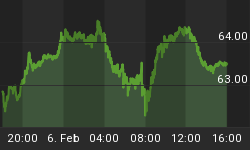Now that Donald Trump has been sworn in, Americans will start getting some glimpses of what his presidency actually means.
Here are some educated guesses of what to expect when it comes to the dollar and sound money issues, based on what we know before the kick-off of Trump's administration.
The Federal Reserve
Donald Trump became very critical of Janet Yellen and the Fed during the final months of the campaign. He accused the Fed of supporting the Obama administration and, by extension, Hillary Clinton by inflating a bubble in the stock markets and keeping interest rates artificially low.

That was before the election. Shortly after the election, Trump signaled he would be inclined to let Yellen finish her term as Fed chair. He must now wrestle with the same dilemma faced by everyone in a position to influence monetary policy. Removing the stimulus by allowing interest rates to float higher is a recipe for real economic pain in the short term. And politicians, in general, care most about winning their next election.
Trump is taking credit for the rally in stock prices since his election, and he has certainly stopped talking about bubbles.
On the campaign trail, Trump expressed support for auditing the Federal Reserve. Neither he, nor his people, have taken a public position on the latest incarnation of a bill to audit the Federal Reserve backed by Rand Paul.
Given the incoming administration is showing little inclination to take on the Fed since winning the election, odds are Trump and company will be hands off with regards to monetary policy - at least as long as the Fed keeps markets propped up.
Federal Deficits and Debt
Trump is advocating for tax cuts and increased spending on infrastructure and defense. He expects his plans will drive strong economic growth. He says growth along with reduced waste and fraud will allow government to avoid major deficit increases. We'll find out soon enough if this is anything more than campaign rhetoric.
Tax cuts may well be on the way, and they would certainly be well received. We might even see higher rates of economic growth, though Trump has been handed a lousy hand. But we doubt Trump will put an end to deficits and metastasizing debt - and there is virtually no support in Congress for that in any event. Politicians have been finding a way to spend way beyond their means for decades - through good times and bad.
There is already evidence that Trump himself does not plan to balance the budget.

He has suggested now is an opportune time for government to borrow even more because interest rates are so low. His pick for Treasury Secretary, Steve Mnuchin, wants to take a look at issuing Treasury debt with durations as long as 70 years in order to make the most out of today's historically low borrowing costs!
Ultimately, the proof will be in the pudding later this year when the new administration and the Republicans controlling Congress grapple with the debt ceiling. Americans will find out for certain whether or not there is any genuine commitment to controlling the explosion in debt we've witnessed in recent decades.
Our expectation is that Washington DC remains fundamentally unchanged in this regard. Politicians will opt for growth now and hope the consequences come later. The rising debt and ongoing deficits should weigh on the dollar, despite the rally we have seen in recent weeks. Gold and silver prices will therefore be underpinned.
Dishonest Markets
Trump has talked about scaling back a handful of regulatory agencies (including the EPA) and also reining in federal contractors. But he and his people have been largely silent when it comes to Wall Street banks and the federal agencies who provide cover for the cheating there.
We discussed the Federal Reserve, above. The central bank is privately owned by the nation's largest banks and, perversely, tasked with regulating them. No one from the incoming administration is talking about that conflict of interest. Trump has not threatened to dismantle the CFTC or the SEC and end their cozy relationship with the banks and brokerages.
Prosecuting fraud and market rigging do not appear on the list of priorities. So, it is hard to be optimistic when it comes to a Trump administration tackling the federal government's role in fostering dishonest markets.
Notwithstanding his pick for Treasury Secretary and Commerce Secretary, at least Trump himself does not appear beholden to Wall Street. And he is certainly aware that banks lent most of their support to Hillary Clinton. So, he may be the only president in recent memory who may be open to reforms given the right motivation - for instance, news of even more outlandish cheating.
Conclusion
Trump has had little to say about sound money issues since the election. That could change if he has to contend with a collapse in stock prices, a recession, or a resurgence of price inflation. In that event, he will almost certainly remember the Fed is not a force for good in the economy and may look to place the blame where it belongs.
For now, however, he and his people appear focused on other issues. Meaningful monetary reforms will probably have to wait.















